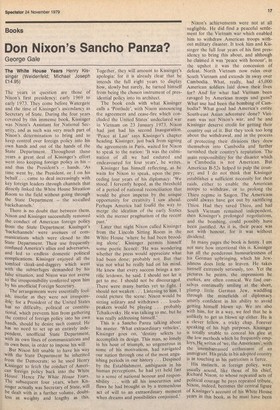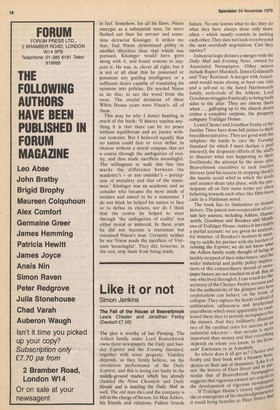Don Nixon's Sancho Panza?
George Gale
The White House Years Henry Kissinger (Weidenfeld; Michael Joseph E-14.95) The years in question are those of Nixon's first presidency: early 1969 to early 1973. They come before Watergate and the time of Kissinger's ascendancy as Secretary of State. During the four years covered by this immense book, Kissinger was Nixon's Assistant for National Security, add as such was very much part of Nixon's determination to bring and to keep control over foreign policy into his own hands and out of the hands of the State Department. Throughout these years a great deal of Kissinger's effort went into keeping foreign policy in his — and thus the President's — hands. 'As time went by, the President, or I on his behalf ... came to deal increasingly with key foreign leaders through channels that directly linked the White House Situation Room to the field without going through the State Department — the so-called backehannels.'
There is no doubt that between them, Nixon and Kissinger successfully removed the conduct of American foreign policy from the State Department. Kissinger's backchannels' were avenues of communications which were closed to the State Department. Their use frequently confused America's allies and adversaries, and led to endless domestic political complications, Kissinger enjoyed all the tomfool cloak-and-daggery which went With the subterfuges demanded by his false situation, and Nixon was not averse to the irresponsibility conferred upon him by his unofficial Foreign Secretary.
The arrangements were essentially foolish, insofar as they were not irresponsible: for a President of the United States has no difficulty, political or constitutional, which prevents him from gathering the control of foreign policy into his own hands, should he desire such control. He has no need to set up an entirely independent, unofficial State Department, With its own lines of communications and its own boss, in order to impose his will. But Nixon felt unable to have his way With the State Department he inherited from the Democrats; so he used Henry Kissinger to fetch the conduct of American foreign policy back into the White House, Hence The White House Years. The subsequent four years, when Kissinger actually was Secretary of State, will be dealt with in a further volume, doubtless as weighty and lengthy as this. Together, they will amount to Kissinger's apologia: for it is already clear that he intends the full eight years to display how, slowly, but surely, he turned himself from being the chosen instrument of presidential policy into its architect.
The book ends with what Kissinger calls a 'Postlude', with Nixon announcing the agreement and cease-fire which concluded the United States' undeclared war in Vietnam on 23 January .1973. Nixon had just had his second Inauguration. 'Peace at Last' says Kissinger's chapter heading. Kissinger, just back from signing the agreements in Paris, waited for Nixon to speak to the nation: 'It was the culmination of all we had endured and endeavoured for four years', he writes.
Kissinger has himself reflecting, as he waits for Nixon to speak, upon the preceding four years of his diplomacy: 'We stood, I fervently hoped, as the threshold of a period of national reconciliation that would be given impetus by the unique opportunity for creativity I saw ahead. Perhaps America had found the way to merge the idealism of the early Sixties with the sterner pragrnatism of the recent past.' Later that night Nixon called Kissinger from the Lincoln Sitting Room in the White House 'where he had been brooding alone'. Kissinger permits himself some poetic licence: 'He was wondering whether the press would appreciate what had been done; probably not. But that was not what he really had on his mind. He knew that every success brings a terrific letdown, he said. I should not let it get to me. I should not be discouraged. There were many battles yet to fight. I should not weaken Listening to him, I could picture the scene: Nixon would be sitting solitary and withdrawn ... loudspeakers would be playing ... probably Tchaikovsky. He was talking to me, but he was really addressing hiinself.' This is a Sancho Panza talking about his master. 'What extraordinary vehicles', Kissinger goes on, 'destiny selects to accomplish its design. This man, so lonely in his hour of triumph, so ungenerous in some of his motivations, had navigated our nation through one of the most anguishing periods in our history ... Despised by the Establishment, ambiguous in his human perceptions, he had yet held fast to a sense of national honour and respon sibility with all his insecurities and flaws he had brought us by a tremendous act of will to an extraordinary moment when dreams and possibilities conjoined.' Nixon's achievements were not at all negligible. He did find a peaceful settlement for the Vietnam war which enabled him to withdraw American troops without military disaster. It took him and Kissinger the full four years of his first presidency to bring this about, and although he claimed it was 'peace with honour', in the upshot it was the concession of defeat. North Vietnam now rules over South Vietnam and extends its sway over Cambodia. What, really, had 45,000 American soldiers laid clow-n their lives for? And' for what had Vietnam been ravaged by American troops and guns? What use had been the bombing of Cambodia? What good had America's entire, South-east Asian adventure' done? Vietnam was not Nixon's war, and he and Kissinger deserve credit for getting their country out of it. But they took too long about the withdrawal, and in the process of Protecting their divisions they drew themselves into Cambodia and further tarnished their country's reputation. The main responsibility for the disaster which is Cambodia is not American. But American B-52s helped to pulp the country; and I do not think that Kissinger establishes a sufficient necessity for their raids, either to enable the American troops to withdraw, or to prolong the Thieu regime in Saigon. The Americans could always have got out by sacrificing Thieu. Had they saved "'hien, and had South Vietnam remained independent, then Kissinger's prolonged negotiations, and the bombing, could possibly have been justified. As it is, their peace was not with honour, for it was without dividend.
In many pages the book is funny. 1.am not sure how intentional this is. Kissinger has all the ponderous humourlessness of his German upbringing, which his Jewishness does little to leaven. He takes himself extremely seriously, too. Yet the pictures he paints, the impressions he evokes, are often comical, We find ourselves continually smiling at the short, plump little German Jew, waddling through the minefields of diplomacy utterly confident in his ability to avoid getting himself blown up. We arc also with him, for in a way, we feel that he is unlikely to get us blown up either. He is a clever fellow, a tricky chap. Forever speaking of his high purposes. Kissinger is totally unable to conceal his glee at the low methods which he frequently employs. He writes of 'we, the Americans', with the unembarrassed enthusiasm of an immigrant. His pride in his adopted country is as touching as his patriotism is fierce. His instincts, in foreign policy, were usually sound, like those of his chief, Richard Nixon, to whose repeated acts of political courage he pays repeated tribute., Nixon, indeed, becomes the central figure of Kissinger's account of his White House years in this book, as he must have been in fact. Somehow, for all his flaws, Nixon emerges as a substantial man, far more fleshed out than his servant and sometime detractor Kissinger. It strikes me that, had Nixon determined policy in another direction than that which was pursued, Kissinger would have gone along with it, arid found reasons to support it. He was, is, clever all right; but it is not at all clear that he possessed or possesses any guiding intelligence or a sufficient desire capable of translating his opinions into policies. He needed Nixon to do this; to see the wood from the trees. The crucial decisions of these White House years were Nixon's: all of them.
This may be why I detect humbug in much of the book: 'If history teaches anything it is that there can be no peace without equilibrium and no justice without restraint. But I believed equally that no nation could face or even define its choices without a moral compass that set a course through the ambiguities of reality, and thus made sacrifices meaningful. The willingness to walk this fine line marks the difference between the academic's — or any outsider's — perception of moralirty and that of the statesmen.' Kissinger was an academic and an outsider who became the most inside of insiders and aimed to be a statesman. I do not think he helped his nation to face or to define its choices, nor do I think that the course he helped to steer through 'the ambiguities of reality' was either moral or immoral. In these years he did not become a statesman but remained Nixon's man. Certainly neither he nor Nixon made the sacrifices of Vietnam `meaningful'. They did, however, in the end, stop them from being made.



































 Previous page
Previous page